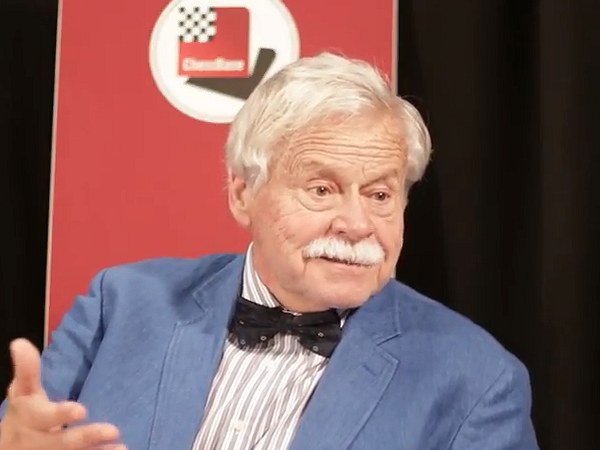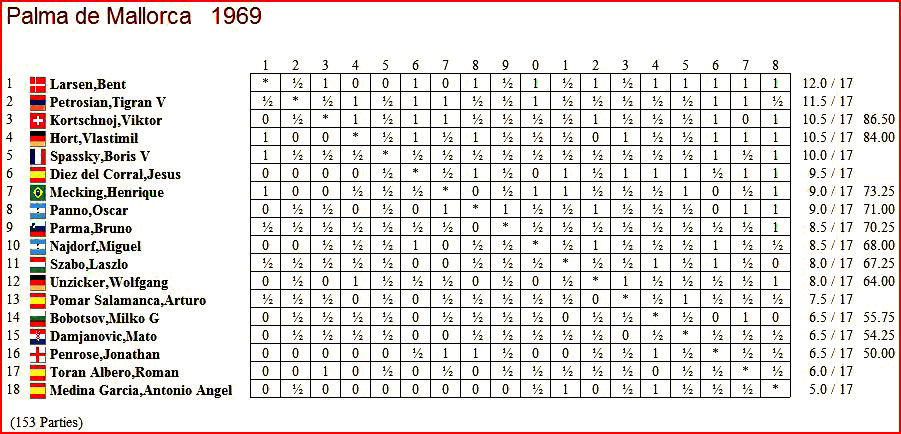


ChessBase 17 - Mega package - Edition 2024
It is the program of choice for anyone who loves the game and wants to know more about it. Start your personal success story with ChessBase and enjoy the game even more.
Photo: Deutsche Fotothek [CC BY-SA 3.0], via Wikimedia Commons

This suggestion was well-intended but also a slight reproach. Although we were a generation apart, Wolfgang and I had always been good chess friends. At first he suspected that I might be a communist spy but when these suspicions turned out to be unfounded, he offered me the informal German "Du". I appreciated that a lot.
Unzicker indeed knew much about chess and the chess world, but he has published relatively little. Maybe this was due to his profession as a judge. As a judge, he first of all needed water-tight proofs. He did not care for assumptions and half-truths.
But back to the far-away past. On Sunday, August 20, 1950, the first Chess Olympiad after World War II begins in Dubrovnik. In the Spring of 1950 the cows all over Yugoslavia had returned from the commonly owned socialist stables to private individual housing. The farmer is acknowledged as private person by the state and can again decide on his own about his land and property. The relationship Tito — Stalin is disturbed. An ideological quarrel and schism. Yugoslavia goes its own way and Marshal Josip Broz Tito becomes patron of the 9th Chess Olympiad in Dubrovnik.
 On my desk lies the book "Turnir nacija Dubrovnik 1950", to my mind by far the best book ever written about a Chess Olympiad. Why? It is objective, full of information, and with lots of photos, caricatures, and very well annotated games. It documents everything exactly and precisely in its large-size cloth-binding, allowing the reader to follow the event closely.
On my desk lies the book "Turnir nacija Dubrovnik 1950", to my mind by far the best book ever written about a Chess Olympiad. Why? It is objective, full of information, and with lots of photos, caricatures, and very well annotated games. It documents everything exactly and precisely in its large-size cloth-binding, allowing the reader to follow the event closely.
But what is missing from the tournament? The entire Socialist Bloc grumbles and boycotts. Revenge? Greetings from comrade Dschugashvili Stalin! Therefore only 16 countries started in Dubrovnik, the beautiful city at the Adria. Strange, but at the very first Chess Olympiad in London 1927, too, only 16 countries took part.
West Germany was allowed to rejoin FIDE in 1950. While the East German players had to stay at home because of the reasons mentioned above, the West Germans could play in Dubrovnik. For Unzicker, it was the beginning of a successful international chess career. He played on board one and scored 11 / 14 (78.6%), just as Miguel Najdorf — the best result on board one!
The following game is an example of his style:
Sicilian Defense with 2.c3 - Alapin Variation
Sergei Tiviakov started playing the line 1.e4 c5 2.c3 in the Sicilian Defence as White in 1988. Since then, he has employed it in more than 100 games, including a yearlong period when he I managed to win twelve 2.c3-games in a row. White tries to occupy the centre with a second pawn, and Black must know his stuff very well in order to be able to equalize. And this is only possible with 2...Nf6 – all other lines give the first player a small edge everywhere. Especially against stronger opponents, 2.c3 is an excellent weapon.
But when did we first meet at the chess board? In the second round of the strong Palma de Mallorca tournament 1969.
Semi-Tarrasch: A universal weapon against 1.d4
Even though the Semi-Tarrasch cannot offer a complete repertoire against 1.d4, being conditioned of White’s move order, it is an excellent complement to the Nimzoindian Defence. Throughout history, great players like Fischer, Kortschnoj and Kramnik have included the Semi-Tarrasch in their repertoire which strongly speaks about its safe character and Black’s possibilities for counterplay. GM Mihail Marin presents a complete Semi-Tarrasch repertoire for Black, explaining the main strategic ideas of the resulting structures.
Wolfgang played the complicated position better and deservedly won. Worth mentioning is Larsen's optimism: after two defeats (in round 1 he had lost against Korchnoi, in round 2 against Unzicker) he had to play me in round 3. Larsen and I both started with 0 / 2 and against me Larsen lost his third game in a row. "That doesn't matter", said the eternal optimist while we analysed the game, "I feel very well and I will win the tournament anyway!" I could hardly trust my ears!
Here's the tournament table to give the reader a chance to check whether Larsen's optimism was justified…

Click or tap to expand
Bent Larsen knew a lot of things apart from chess but maybe Wolfgang knew even more. I knew very little at that time! Since the Soviet invasion of 1968, out of protest I had decided to speak no more Russian. But to my great surprise I realised that Wolfgang did not only understand Russian but that he was able to converse rather fluently in it. However, he spoke with a quaint Czarist accent and used a lot of archaic expressions. Maybe he received lessons from refugees who had to flee Russia after the October Revolution? At any rate, Boris Spassky could imitate him perfectly. This gave us a lot of fun and many reasons to laugh! Unzicker liked to correct my Prague German, I corrected his Czarist Russian. Our jokes and puns were often rather bold and juicy and at times I did not grasp them immediately...

Wolfgang Unzicker in 2001 | Photo: André Schulz
Wolfgang had a phenomenal memory. I suppose that was one reason for his strength. I would estimate that he could store and recall up to 200 model games in his memory — sidelines and analyses, of course, included. To follow the course of a master game he simply switched his memory to "on". In the 50s and 60s we, his opponents, had no clue about his memory technique.
At the board he was always correct and exceptionally fair. Sometimes he even might have had too much understanding for his opponents. A famous and well-known incident from one of his encounters with the legendary Bobby Fischer is proof of that. In their game in Buenos Aires 1960, Fischer is under pressure and touches his h-pawn. He then realises that moving the pawn loses. Two fair players face each other.
Unzicker remembers:
On the 12th move — I did not trust my eyes — Fischer, who was to move, touched his h-pawn, apparently to move it. After a few seconds he let go of it again. In this moment Fischer showed exemplary sportsmanship. As he had touched the pawn he moved it according to the rules even though it lost. I did not intend to protest if he had moved another piece. I would have been hard pressed to prove that he had violated the 'touch-move' rule, and I also thoroughly dislike to turn to the tournament director because of such incidents. Fischer also lost this game because of his fairness, and I have never derived pleasure from this win.
But against former World Champion Mikhail Tal, Unzicker played a very impressive game.
Sicilian Paulsen Powerbook 2016
In our Powerbook we have brought together all games with the ECO codes B40-B49. Added to 62 000 selected master games from both Mega and correspondence chess there 122 000 high class games from the engine room on playchess.com.
The readers might think that Tal had the white pieces. No, and no again. Wolfgang was a very universal player and he could attack and sacrifice like Tal. Bravo! I am certain that Wolfgang would have been a World Championship candidate had he been a chess professional.
Family, job, chess — this was the hierarchy of his life-rating. He was lucky with his two sons. Alexander and Ferdinand shared their father's love for chess and followed in his footsteps. Today they are strong amateurs and play reasonably well. Here, I would like to use the occasion to express my heartfelt thanks to one of them. During my blind-simul in Munich 1980 he (was it Alexander? or Ferdinand?) transmitted the moves to me. He did it calmly, precisely, without errors — simply excellent, which allowed me to focus on my 20 games.
"Dear Wolfgang, I would like to tell you a joke. Yes, in Russian. And no, I am certain, you have not heard it before!“ Yours, Vlastimil Hort.
Translation from German: Johannes Fischer